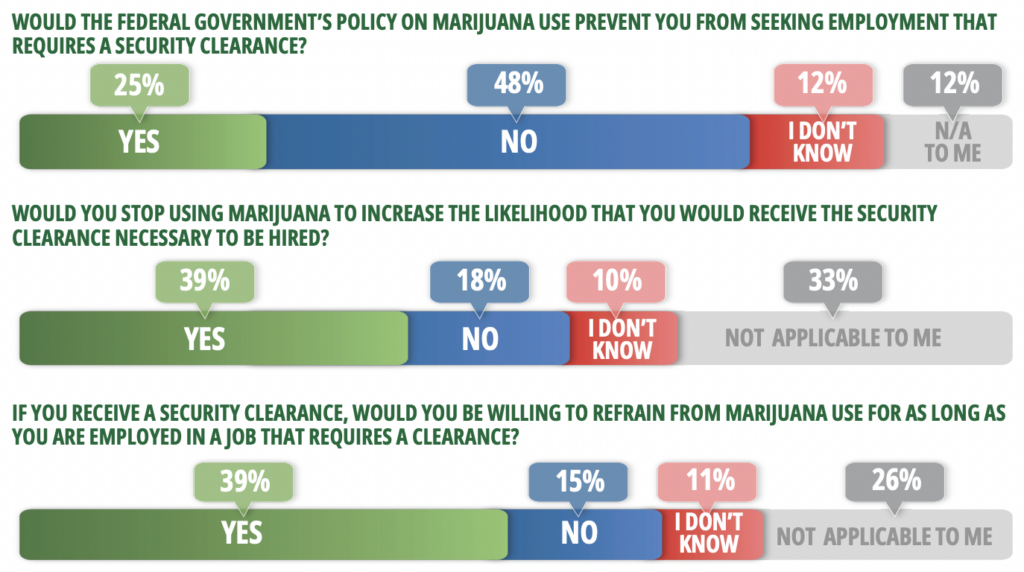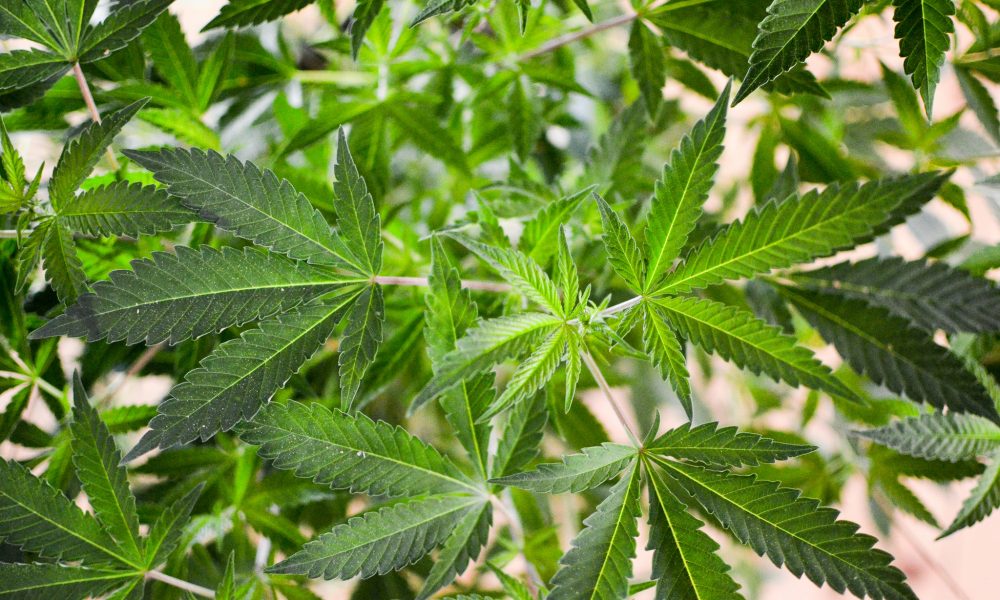As the federal government struggles to recruit young people, a recent survey found that 30 percent of those between the ages of 18 and 30 have either declined to apply or withdrawn applications for jobs because of strict marijuana policies required for security clearances.
The poll, published last month on the unofficial marijuana holiday April 20 by ClearanceJobs and the Intelligence and National Security Foundation (INSF), interviewed young adults about federal employment policies, focusing on cannabis.
Participants were first asked whether they’d consider working in a federal position that requires security clearance, and almost 80 percent said they either would or might consider applying—although 40 percent also said that they’ve used marijuana in the past year.
One of the most notable findings is that 20 percent of participants said that they’ve declined to apply for federal jobs because of the government’s restrictive cannabis policies. Another 10 percent said they’ve withdrawn applications because of the marijuana rules.
The survey also found that 25 percent say that the government’s marijuana policy would prevent them from seeking employment requiring a security clearance in the future. While 39 percent said they’d be willing to abstain from cannabis in order to secure a federal job, 18 percent said they wouldn’t. And 15 percent said that they wouldn’t stop using marijuana after getting a security clearance.

Via Clearancejobs.
Interestingly, most of the panel didn’t have a firm grasp on what the government’s cannabis policy actually is. Sixteen percent said that any marijuana use automatically disqualifies applicants for security clearance, 37 percent said there’s no eligibility impact, 24 percent said it is one of several factors that are considered for clearance and 23 percent said they didn’t know.
Similarly, there’s confusion about the policies for people who’ve already obtained security clearances, with nine percent saying those individuals can use marijuana anywhere, 31 percent saying they can use in a legal jurisdiction, 33 percent saying cannabis use is prohibited and 26 percent saying they didn’t know.
Only four percent of participants correctly answered both questions about what the federal government’s security clearance rules are for applicants and those who are already cleared.
The survey involved interviews with 905 adults 18-30 living in Virginia, Maryland, the District of Columbia, California, Florida, Texas and Colorado. The interviews took place in February. The margin of error is +/- 3.23 percentage points.
Drug Use Confusion Trips Up Cleared Candidates – https://t.co/CbBqiHX3Dk #clearancejobs
— ClearanceJobs 🇺🇸 (@ClearanceJobs) April 20, 2023
While marijuana employment policies under federal prohibition remain strict, various agencies have moved to loosen requirements as more states have moved to enact legalization.
For example, the U.S. Secret Service (USSS) recently updated its employment policy to be more accommodating to applicants who’ve previously used marijuana, making it so candidates of any age become eligible one year after they last consumed cannabis. Previously, there were stricter age-based restrictions.
The federal Bureau of Alcohol, Tobacco, Firearms and Explosives (ATF) has also revised its cannabis rules for job applicants. Applicants who’ve grown, manufactured or sold marijuana in compliance with state laws while serving in a “position of public responsibility” will no longer be automatically disqualified.
Late last year, draft documents obtained by Marijuana Moment showed that the federal Office of Personnel Management (OPM) was proposing to replace a series of job application forms for prospective workers in a way that would treat past cannabis use much more leniently than under current policy.
The Biden administration instituted a policy in 2021 authorizing waivers to be granted to certain workers who admit to prior marijuana use, but certain lawmakers have pushed for additional reform.
For example, Rep. Jamie Raskin (D-MD) said at a congressional hearing on marijuana legalization last year that he intended to file a bill aimed at protecting federal workers from being denied security clearances over marijuana.
Last year, the nation’s largest union representing federal employees adopted a resolution in support of marijuana legalization and calling for an end to policies that penalize federal workers who use cannabis responsibly while they’re off the clock in states where it is legal.
The director of national intelligence (DNI) said in 2021 that federal employers shouldn’t outright reject security clearance applicants over past use and should use discretion when it comes to those with cannabis investments in their stock portfolios.
FBI also updated its hiring policies that year to make it so candidates are only automatically disqualified from joining the agency if they admit to having used marijuana within one year of applying. Previously, prospective employees of the agency could not have used cannabis within the past three years.
The Department of Transportation (DOT) also took a different approach to its cannabis policy in 2020, stating in a notice that it would not be testing drivers for CBD. However, DOT has more recently reiterated that the workforce it regulates is prohibited from using marijuana and will continue to be tested for THC, regardless of state cannabis policy.
Rep. Earl Blumenauer (D-OR) sent a letter to the head of DOT last year, stating that the agency’s policies on drug testing truckers and other commercial drivers for marijuana are unnecessarily costing people their jobs and contributing to supply chain issues.
The Environment Protection Agency (EPA) also emphasized to its workers that they are prohibited from using marijuana—or directly investing in the industry—no matter the state law or changes in “social norms” around cannabis.
While the Biden administration did institute a waiver policy meant to provide discretion as it relates to federal employment and past cannabis use, it’s come under fire from advocates following early reports that the White House fired or otherwise punished dozens of staffers who were honest about their history with marijuana.
Then-White House Press Secretary Jen Psaki attempted to minimize the fallout, without much success, and her office released a statement in 2021 stipulating that nobody was fired for “marijuana usage from years ago,” nor has anyone been terminated “due to casual or infrequent use during the prior 12 months.”
Michigan Officials Move To End Pre-Employment Marijuana Testing For Government Workers
Photo courtesy of Philip Steffan.
Read the full article here









